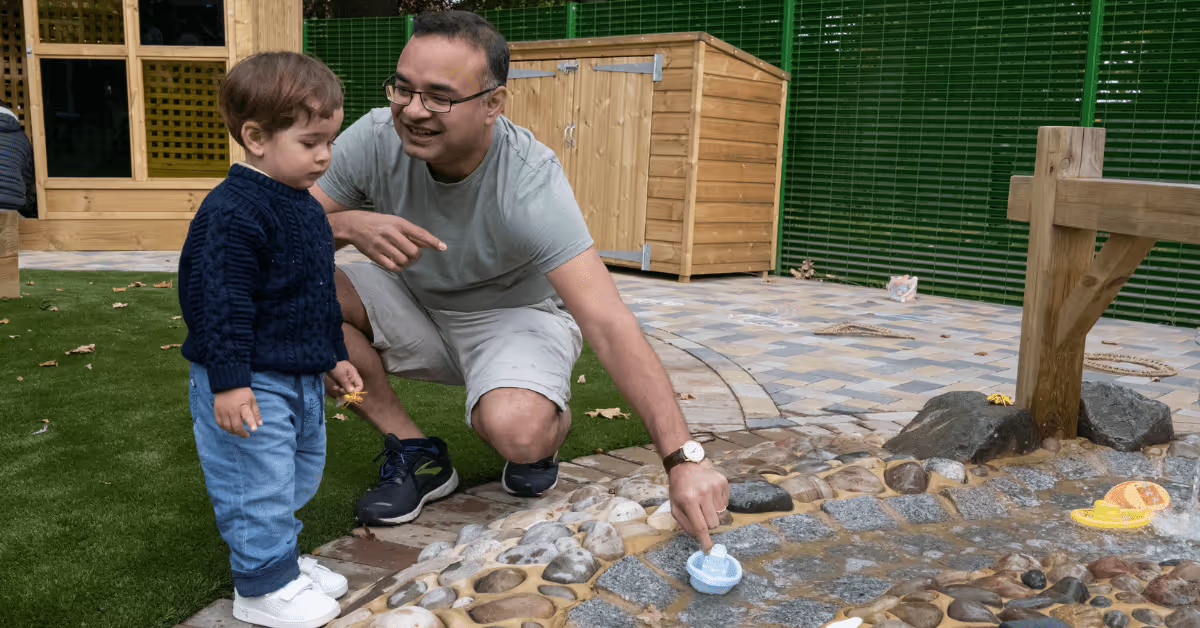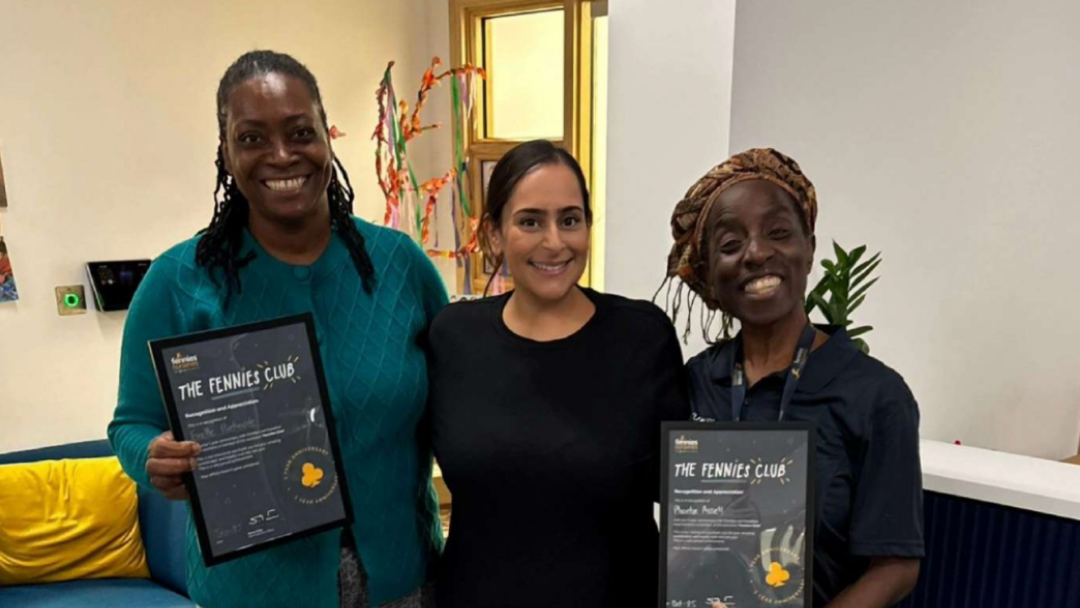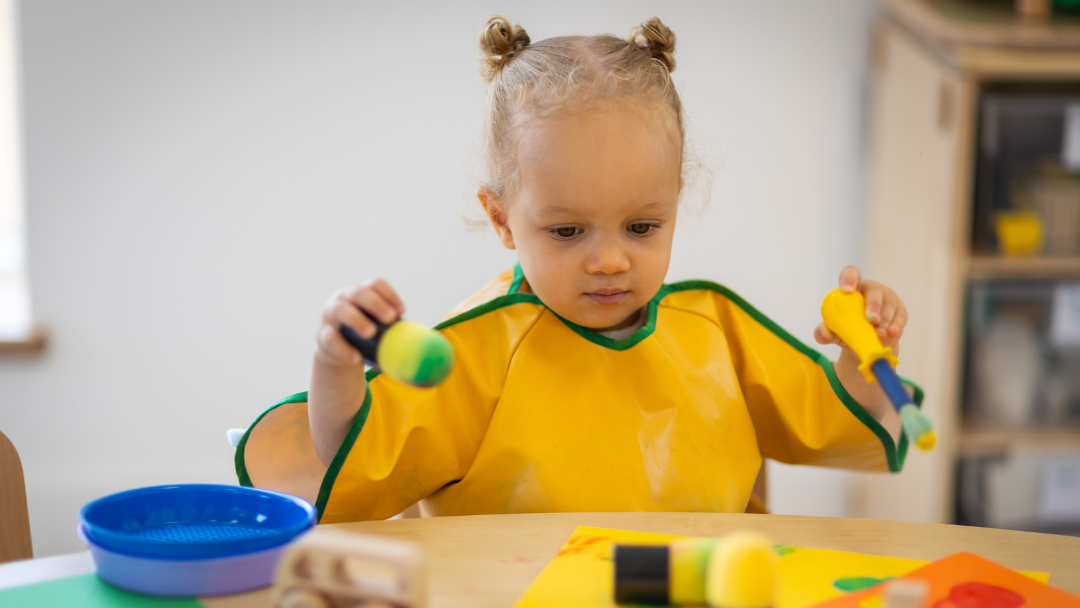Find out everything you need to know with our parent's guide to Birth to 5 Matters.
Birth to 5 Matters, EYFS, Early Learning Goals... If your child goes to nursery, these are just a few of the phrases you might hear on a regular basis. Confused? Don’t worry! This blog post will explain everything you need to know about the Birth to 5 Matters guidance and how it is used in your child’s nursery.
What is birth to 5 matters?
The Birth to 5 Matters guidance is designed to support the implementation of the statutory EYFS framework in early years settings. This guidance is non-statutory but provides rich, research-led guidance for practitioners so that they can fully implement the EYFS framework. Essentially, the EYFS framework is the what and the Birth to 5 guidance is the how.
When this guidance is used by practitioners, it helps them support the children in their nursery to progress across the seven areas of learning and development (communication and language, physical development, personal, social, and emotional development, literacy, mathematics, understanding the world and expressive arts and design).
Birth to 5 Matters is based on four principles which are at the core of the EYFS. These are:
A unique child
Children have their own individual interests, likes and dislikes that they will figure out at their own pace. Birth to 5 matters encourages nurseries to ensure every child is represented and included.
Positive relationships
Children have their own individual interests, likes and dislikes that they will figure out at their own pace. Birth to 5 Matters encourages nurseries to ensure every child is represented and included.

The relationships children have in their early years shape their nursery experience and development. Your child should have a strong bond with a key person, and you should feel comfortable with the care the nursery is providing your child.
Enabling environment
A child’s nursery environment should offer rich learning opportunities, whether this is indoors or outdoors.
Learning and development
The Birth to 5 Matters guidance recognises that children learn the best through play and that it is the practitioner's role to encourage this learning by offering exciting and innovative learning opportunities. It also encourages children to lead their play, learn through social interactions with other children and adults, and incorporate the three prime areas of learning (personal, social and emotional development, communication and language, and physical development).
What is the purpose of Birth to 5 Matters?
The main purpose of the Birth to 5 Matters guidance is to be implemented alongside the EYFS framework. Every aspect of learning and development laid out within the EYFS statutory framework must be followed within every early years setting. This guidance is designed to help practitioners fully implement the EYFS framework and carry out their statutory responsibilities to support children’s learning and development.
The Birth to 5 Matters guidance recognises the following key aspects:
- The importance of placing the child at the centre of learning
- The child’s connections within their family, communities, cultures and the natural world
- The need to take into consideration the ‘whole child,’ this includes physical, social and emotional well-being, health and learning
- The child’s rights as members of society under the UNCRC (United Nations Convention on the Rights of the Child)
- The education sector’s responsibilities
- The statutory requirements of the SEND (special educational needs and disability) code of practice
When practitioners support children in all of these areas, they can help the children in their nursery progress toward their Early Learning Goals.
What are Early Learning Goals?

Early Learning Goals are the goals children are expected to achieve at the end of reception year. These goals are not part of the curriculum, but they are a broad way of assessing the skills a child may be demonstrating by the end of the EYFS. At the end of the reception year, children are assessed against 17 Early Learning Goals.
These assessments are based around the 7 areas of learning previously mentioned and include the following aspects:
Communication and language
- Listening, attention and understanding
- Speaking
Physical development
- Fine motor skills
Personal, social, and emotional development
- Self-regulation
- Managing self
- Building relationships
Literacy
- Comprehension
- Word reading
- Writing
Mathematics
- Numbers
- Numerical patterns
Understanding the world
- Past and present
- People, culture and communities
- The natural world
Expressive arts and design
- Creating with materials
- Being imaginative and expressive
Find out more information about how children are assessed here.
It’s important to remember that these Early Learning Goals are not a test. They are simply used by practitioners as a starting point to create activities and learning opportunities to support children’s development. Through these goals, children are encouraged and challenged to have a greater depth and understanding of things before moving on to new learning.
How does Birth to 5 Matters support Early Learning Goals?

The early years are an important time for children, but learning is a lifelong process. The skills, attitudes, and attributes children develop now will influence them for them for the rest of their lives. This is how Birth to 5 Matters ties into your child’s early learning goals.
Children learn best when they are deeply interested and fully involved. In these first 5 years, children learn about the world through being active, exploring, being creative and learning to think. The Birth to 5 Matters guidance provides practitioners ample information and inspiration to support each child in their nursery to meet their full potential.
What are the benefits of Birth to 5 Matters?
The Birth to 5 Matters guidance is praised for being written by the sector for the sector. It’s highly researched and put together by specialists within the early years industry specifically for each early years development stage. This allows practitioners to provide the highest standard of care in their nursery.

Within the Birth to 5 Matters guidance there is a key focus around freedom for practitioners to plan learning activities based around the interests of the children in their nursery. It clarifies previous misconceptions that children should all be achieving set skills at certain ages and instead there is a recognition that each child learns at their own pace, in different ways and that learning is not linear.
These development stages overlap and allow practitioners to decide children’s next steps and learning goals based on their knowledge of the children.
Assessment through Birth to 5 Matters
Throughout your child’s time at nursery, practitioners will be continually assessing what your child knows, can do and then reflect on how to support their learning as a result, through a cycle of observing, assessing, and planning.
At key points, assessments will be recorded to measure children’s progress and make sure their learning and development is on track to meet their developmental milestones.
The government requires children to have a check at 2 years old, which is done alongside a health check with your Health Visitor. Children then have another assessment when they go into reception as mentioned earlier. This is called the Reception Baseline Assessment and your child’s teacher will look at the Early Learning Goals that were set and assess their development before they transition to Year 1.
Birth to 5 Matters at Fennies
We recognise that children all learn at different rates and tailor the inspiring experiences we offer to each child to support them in their individual learning journey.
FAQ
Subscribe to our newsletter
Stay up to date with Fennies news







.png)


